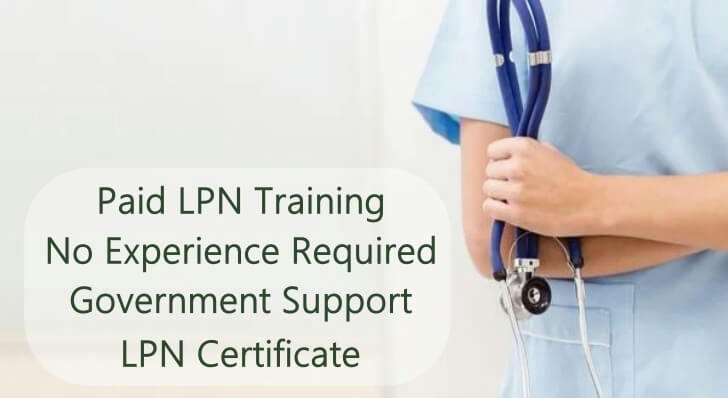Paid LPN Training | No Experience Required | Government Support | LPN Certificate
Can you get an LPN certificate with zero experience? Nursing positions in the United States are in urgent need (increasing by 9%+ in the next ten years), and LPN training positions are growing steadily! Join now, no experience required, paid study, and tuition is borne by the employer. The various resources on this page can help you find the LPN training that suits you. Searchable keywords include: [LPN training near me], [government-supported LPN courses], [LPN paid training], etc.

Why take LPN courses?
- Paid entry: Learn and earn! You will get a salary during the training period, which will reduce financial pressure.
- Government support: Enjoy paid training, employers bear the tuition fees, low learning costs, and obtain a certificate after passing the exam after training.
- Strong demand: The nursing industry continues to be short of people, there are many LPN job opportunities, and the employment prospects are good.
- Starting high salary: After graduation, you can become a registered nurse with an annual salary of up to $65,665.
- Threshold friendly: No experience required! You can apply with a high school diploma and quickly start your medical career.
What is the development prospect of LPN training in the United States?
- Demand is growing steadily: The aging of the U.S. population is intensifying, and the demand for basic care continues to rise. LPNs have stable employment opportunities in nursing homes, clinics and other places.
- The entry threshold is low: Compared with registered nurses (RNs), LPN training cycle is short (usually about 1 year) and the cost is low, which is a way to quickly enter the nursing field.
- Limited development space: LPN’s scope of responsibilities is usually smaller than that of RNs, and salary and promotion opportunities are relatively limited. In the long run, many LPNs will choose to study to become RNs to improve their careers.
What kind of people are suitable for LPN courses?
- 18-25 years old: high school graduates/career changers, zero experience and quick entry, paid learning to reduce the burden, and lay the foundation for medical careers.
- 26-40 years old: those seeking stable career changers, using paid training + benefits, low-cost acquisition of scarce skills, and increased income potential.
- 41-65 years old: those pursuing a new career track, no experience and low threshold (high school education), government support to help re-employment, and get a decent salary.
- Over 65 years old: Physical requirements need to be assessed (involving clinical care), but the policy does not limit age, and those with strong willingness and health conditions can try.
Searchable keywords include: [LPN training near me], [government-supported LPN courses], [LPN paid training], etc.
US LPN career development path
1. Vertical promotion (core path)
- Advanced nursing role: After 1-2 years of further study to become a registered nurse (RN), the salary can be increased by 30%-50%, unlocking positions such as hospital emergency care.
- Continue to study: Some LPNs obtain a bachelor's degree in nursing (BSN) or become a practicing nurse (NP), and move into management or specialty fields.
2. Horizontal expansion
- Specialty certification: Obtain certificates such as wound care and geriatrics, and work as a technical position in a nursing home or dialysis center, with an hourly wage of $30+.
- Transfer to the medical field: You can switch to surgical assistants, pharmaceutical sales or case management positions, and use clinical experience to broaden your career.
3. Deep cultivation at the grassroots level
- Long-term roots in clinics and home care, accumulate experience to become a team leader, and management salary is 15%-25% higher than that of junior LPNs.
In addition to the government, what other institutions provide paid LPN training?
1.Hospital cooperation projects Large hospitals (such as Mayo Clinic partner schools) often provide paid internship training, where trainees work + study every week and are directly hired after graduation.
2.Community college projects State community colleges (such as Santa Monica College in California) jointly set up a "learning allowance program" with nursing homes to cover part of the tuition.
3.Private medical and nursing schools * Ameritech College (Utah): 12-month course with paid clinical rotations. * Unitek College (multi-state branches): Provides targeted training for corporate cooperation, and some courses subsidize 50% of tuition + internship salary.
How to apply for government-supported LPN training (courses)?
1.Confirm qualifications
✅ Hard requirements: high school diploma or equivalent (required)
✅ Health requirements: Able to perform clinical nursing work (assessment, record keeping, patient care, etc.)
2.Select a cooperative project
🔍 Find training programs in cooperation with the government/hospital (such as UW Health or OSF Medical Center + Heartland Community College joint project in the example)
3.Submit application materials
📄 Fill out the institution application form + provide academic qualifications + identity documents (some projects require interviews)
4.Sign a contract and join the company
✍️ Sign an apprenticeship agreement after passing:
* Paid training: immediately enjoy an hourly wage of $18 (LPN apprentice) or $20 (licensed nurse apprentice)
* Benefit lock: paid leave/insurance/tuition reimbursement automatically takes effect
* Work schedule: 4 hours of clinical practice per week (during the semester) + full-time summer vacation (school vacation)
Promotion channel
🚀 Complete the course → obtain a license → become a full-time RN
